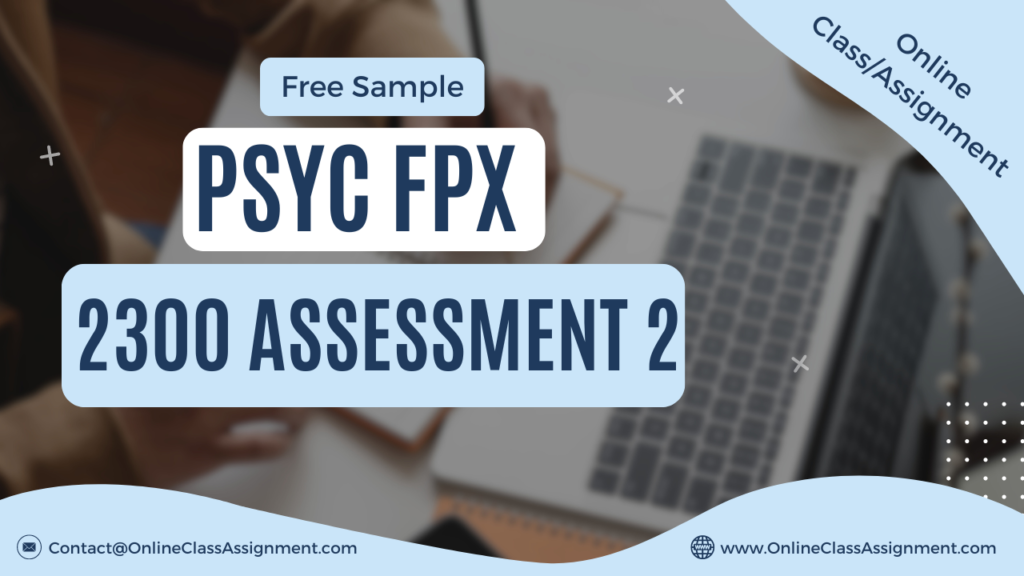
PSYC FPX 2300 Assessment 2 Whats Wrong a Short Assessment
Student Name
Capella University
PSYC FPX 2300 Introduction to Addiction Theories
Prof. Name
Date
Assessment Case Studies
Directions:
Choose one of the individuals described in the case studies in Chapter 6 of your textbook: Ann (page 61), Daniel (page 65), Sam (page 67), or Dean (page 72). Based on the information in the textbook, complete the following form.
Client Name: Ann
Assessment Date: 3/31/22
Substance Use History
| Drug | First Use | Pattern of use over time? | Frequency of use in past month? | Date/amount of most recent use? |
|---|---|---|---|---|
| Alcohol | No | Yes | Everyday | Yesterday |
Sociocultural Factors
- Educational level: n/a
- Employment status: Employed
- Current living situation: Currently lives with husband, children, and “parent from another part of the country.”
- Current or past legal problems: No
- Family history of substance use: She does not have a history of substance use in her family. She has also not previously shown interest in using until now.
- Client’s social support system: Client has a loving family and a husband who is willing and able to support her through this. They both recognize the problem and are seeking therapeutic help.
Diagnostic Criteria Checklist
| Criteria | Yes | No |
|---|---|---|
| Was the substance taken in larger amounts or over a longer period of time than intended? | x | |
| Were important social, occupational, or recreational activities given up or reduced because of substance use? | x | |
| Is there a persistent desire or unsuccessful efforts to cut down or control substance use? | x | |
| Has the substance been used recurrently in physically hazardous situations? | x | |
| Was a great deal of time spent in activities necessary to obtain or use the substance, or recover from the substance? | x | |
| Has use continued despite knowing of having a persistent or recurrent physical or psychological problem that is caused or exacerbated by substance use? | x | |
| Have they continued to use the substance despite having persistent or recurrent social or interpersonal problems caused or exacerbated by the substance use? | x | |
| Has recurrent use of the substance resulted in a failure to fulfill major role obligations at work, school, or home? | x | |
| Is tolerance present? | x | |
| Is withdrawal present? | x | |
| Is there a craving or strong desire or urge to use the substance? | x |
DSM-5 Diagnosis: Alcohol Use Disorder Severe
DSM-5 Diagnostic Code: 303.90 (F10.20)
Basis of Diagnosis:
In the case of Ann, she shows a destructive pattern of alcohol use that if left untreated could result in severe consequences. Following the guidelines of the NAADAC code of ethics and the Diagnostic and Statistical Manual of Mental Disorders (DSM-5), I feel that a diagnosis of severe Alcohol Use Disorder is appropriate. While she and her spouse show a strong willingness to seek help and change, that does not diminish from the fact that she is currently an addict. Given her social support and lack of previous use, she has an excellent prognosis.
PSYC FPX 2300 Assessment 2 Whats Wrong a Short Assessment
Applicable Addictions Perspective:
Given that Ann has not had a history of drinking and has only recently started abusing alcohol in response to a stressor, we can say that this is problematic use at a problematic time. This suggests that she is using alcohol to cope with something that is going on in her environment (Fetting & Fetting, 2016). If caught and treated early, this behavior can change before it leads to something more severe.
Ethical Considerations:
Following the NAADAC code of ethics, I would abide by Federal and state laws when storing personal information (NAADAC, the Association for Addiction Professionals, 2021). This includes keeping the assessment information on an encrypted device or in a locked cabinet in a locked room.
References
American Psychiatric Association. (2013). Diagnostic and statistical manual of mental disorders (5th ed.). https://doi.org/10.1176/appi.books.9780890425596
Fetting, M., & Fetting, M. (2016). Perspectives on substance use, disorders, and addiction: With clinical cases. SAGE.
NAADAC, the Association for Addiction Professionals. (2021). NAADAC/NCC AP Code of Ethics. Alexandria, VA: NAADAC. Retrieved from: https://www.naadac.org/assets/2416/naadac_code_of_ethics_112021.pdf
PSYC FPX 2300 Assessment 2 Whats Wrong a Short Assessment
Get Capella University Free BS Psychology Samples
BIO FPX 1000
COM FPX 1150
HIM FPX 4610
HIS FPX 1150
HUM FPX 1150
PSYC FPX 1000
PSYC FPX 2200
PSYC FPX 2300
